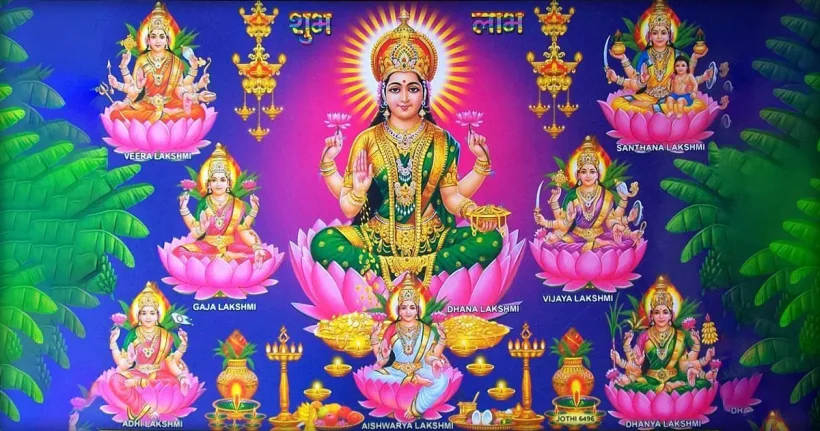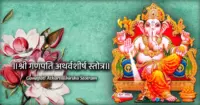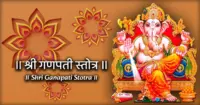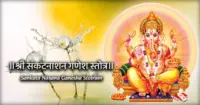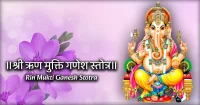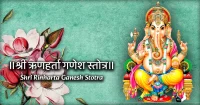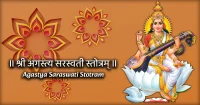The Ashtalakshmi Stotram (श्री अष्टलक्ष्मी स्तोत्र) is a soulful hymn that dedicated to Lakshmi Mata (लक्ष्मी माता) in her eight resplendent forms: Adi Lakshmi, the primal source of abundance; Dhanya Lakshmi, the nurturer of sustenance; Dhairya Lakshmi, the embodiment of courage; Gaja Lakshmi, the harbinger of royal prosperity; Santana Lakshmi, the giver of progeny; Vijaya Lakshmi, the granter of victories; Vidya Lakshmi, the fountain of wisdom; and Dhana Lakshmi, the bestower of material wealth. Each form represents a distinct facet of divine grace, encompassing courage, fertility, intellect, and prosperity. Through the rhythmic chanting of this sacred stotram, devotees invoke the goddess’s blessings to achieve harmony, growth, and holistic well-being.
॥Shri Ashtalakshmi Stotram॥
॥श्री अष्टलक्ष्मी स्तोत्र॥
1. आदिलक्ष्मी (Adi Lakshmi)
सुमनस वन्दित सुन्दरि माधवि, चन्द्र सहोदरि हेममये
मुनिगणमण्डित मोक्षप्रदायनि, मञ्जुळभाषिणि वेदनुते।
पङ्कजवासिनि देवसुपूजित, सद्गुण वर्षिणि शान्तियुते
जय जय हे मधुसूदन कामिनि, आदिलक्ष्मि सदा पालय माम् ॥
Hindi Meaning: हे आदिलक्ष्मी! जो सुंदर, चंद्रमा की बहन, और स्वर्ण जैसी चमक वाली हैं, जिनकी प्रशंसा ऋषि करते हैं और जो मोक्ष प्रदान करती हैं। आप कमल पर निवास करती हैं, देवताओं द्वारा पूजित हैं और शांति व गुणों की वर्षा करती हैं। मेरी रक्षा करें।
English Meaning: O Adi Lakshmi Mata! Beautiful and radiant like gold, sister of the moon, revered by sages, and grantor of liberation. You reside on a lotus, are worshipped by gods, and shower virtues and peace. Protect me always.
2. धान्यलक्ष्मी (Dhanya Lakshmi)
अहिकलि कल्मषनाशिनि कामिनि, वैदिकरूपिणि वेदमये
क्षीरसमुद्भव मङ्गलरूपिणि, मन्त्रनिवासिनि मन्त्रनुते।
मङ्गलदायिनि अम्बुजवासिनि, देवगणाश्रित पादयुते
जय जय हे मधुसूदन कामिनि, धान्यलक्ष्मि सदा पालय माम् ॥
Hindi Meaning: हे धान्यलक्ष्मी! जो पापों का नाश करती हैं, वैदिक रूप में प्रतिष्ठित हैं, और क्षीरसागर से प्रकट हुई हैं। आप मंगल रूपी हैं, मंत्रों में वास करती हैं, और सभी को शुभता प्रदान करती हैं। मेरी रक्षा करें।
English Meaning: O Dhanya Lakshmi Mata! Destroyer of sins, embodiment of the Vedas, and born from the ocean of milk. You bring auspiciousness and reside in sacred chants. Bless and protect me always.
3. धैर्यलक्ष्मी (Dhairya Lakshmi)
जयवरवर्णिनि वैष्णवि भार्गवि, मन्त्रस्वरूपिणि मन्त्रमये
सुरगणपूजित शीघ्रफलप्रद, ज्ञानविकासिनि शास्त्रनुते।
भवभयहारिणि पापविमोचनि, साधुजनाश्रित पादयुते
जय जय हे मधुसूधन कामिनि, धैर्यलक्ष्मी सदा पालय माम् ॥
Hindi Meaning: हे धैर्यलक्ष्मी! आप वैष्णवी, भार्गवी, और मंत्रस्वरूप हैं। देवगण आपकी पूजा करते हैं, आप शीघ्र फल प्रदान करती हैं, और ज्ञान को बढ़ाती हैं। आप भय और पापों का नाश करती हैं। मेरी रक्षा करें।
English Meaning: O Dhairya Lakshmi Mata! Manifestation of courage, adored by gods, and remover of fear and sins. You nurture wisdom and grant quick rewards. Protect me always.
4. गजलक्ष्मी (Gaja Lakshmi)
जय जय दुर्गतिनाशिनि कामिनि, सर्वफलप्रद शास्त्रमये
रधगज तुरगपदाति समावृत, परिजनमण्डित लोकनुते।
हरिहर ब्रह्म सुपूजित सेवित, तापनिवारिणि पादयुते
जय जय हे मधुसूदन कामिनि, गजलक्ष्मी रूपेण पालय माम् ॥
Hindi Meaning: हे गजलक्ष्मी! आप दुर्गति का नाश करती हैं और सभी फल प्रदान करती हैं। रथ, गज, और घोड़ों के साथ आप सज्जित हैं। आप विष्णु, शिव और ब्रह्मा द्वारा पूजित हैं। मेरी रक्षा करें।
English Meaning: O Gaja Lakshmi Mata! Dispeller of hardships and bestower of all fruits. Surrounded by elephants, horses, and chariots, you are revered by Vishnu, Shiva, and Brahma. Bless me always.
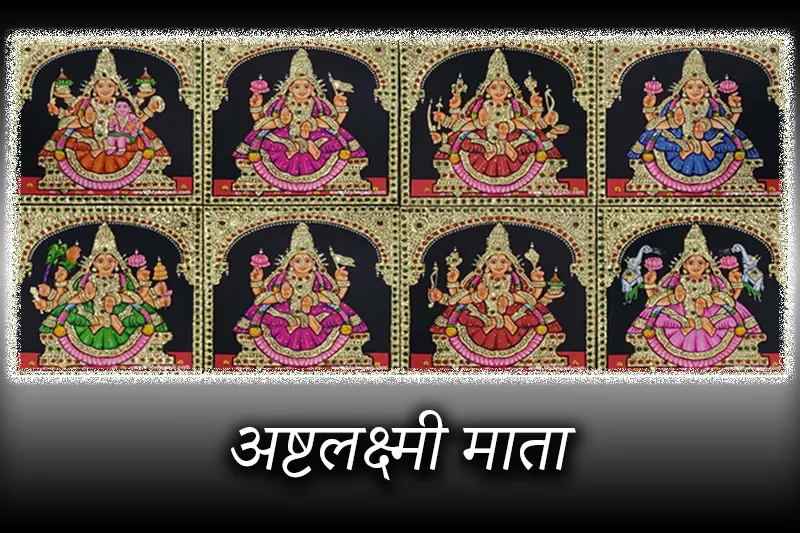
5. सन्तानलक्ष्मी (Santana Lakshmi)
अहिखग वाहिनि मोहिनि चक्रिणि, रागविवर्धिनि ज्ञानमये
गुणगणवारिधि लोकहितैषिणि, स्वरसप्त भूषित गाननुते।
सकल सुरासुर देवमुनीश्वर, मानववन्दित पादयुते
जय जय हे मधुसूदन कामिनि, सन्तानलक्ष्मी त्वं पालय माम् ॥
Hindi Meaning: हे सन्तानलक्ष्मी! आप ज्ञानमयी हैं, और लोकहितकारी हैं। सुर-असुर सभी आपकी पूजा करते हैं। मेरी संतान की रक्षा करें।
English Meaning: O Santana Lakshmi Mata! Goddess of fertility and knowledge. Worshipped by gods, sages, and humans alike, protect my children and family.
6. विजयलक्ष्मी (Vijaya Lakshmi)
जय कमलासनि सद्गतिदायिनि, ज्ञानविकासिनि गानमये
अनुदिनमर्चित कुङ्कुमधूसर, भूषित वासित वाद्यनुते।
कनकधरास्तुति वैभव वन्दित, शङ्कर देशिक मान्य पदे
जय जय हे मधुसूदन कामिनि, विजयलक्ष्मी सदा पालय माम् ॥
Hindi Meaning: हे विजयलक्ष्मी! आप ज्ञान, समृद्धि और विजय प्रदान करती हैं। कुमकुम से पूजित, आप हमेशा मेरी विजय सुनिश्चित करें।
English Meaning: O Vijaya Lakshmi Mata! The goddess of success and triumph, you grant prosperity and knowledge. Ensure my victory in all endeavors.
7. विद्यालक्ष्मी (Vidya Lakshmi)
प्रणत सुरेश्वरि भारति भार्गवि, शोकविनाशिनि रत्नमये
मणिमयभूषित कर्णविभूषण, शान्तिसमावृत हास्यमुखे।
नवनिधिदायिनि कलिमलहारिणि, कामित फलप्रद हस्तयुते
जय जय हे मधुसूदन कामिनि, विद्यालक्ष्मी सदा पालय माम् ॥
Hindi Meaning: हे विद्यालक्ष्मी! आप ज्ञान, शांति, और सुंदरता की देवी हैं। आप दुखों को हरती हैं और इच्छित फल प्रदान करती हैं।
English Meaning: O Vidya Lakshmi Mata! Goddess of wisdom and knowledge, remover of sorrows, and giver of all desired blessings. Protect me always.
8. धनलक्ष्मी (Dhana Lakshmi)
धिमिधिमि धिंधिमि धिंधिमि-धिंधिमि, दुन्दुभि नाद सुपूर्णमये
घुमघुम घुङ्घुम घुङ्घुम घुङ्घुम, शङ्खनिनाद सुवाद्यनुते।
वेदपूराणेतिहास सुपूजित, वैदिकमार्ग प्रदर्शयुते
जय जय हे मधुसूदन कामिनि, धनलक्ष्मि रूपेणा पालय माम् ॥
Hindi Meaning: हे धनलक्ष्मी! आपके गुण शंख और ढोल की आवाज जैसे गूंजते हैं। आप समृद्धि और धन की देवी हैं। मेरी रक्षा करें।
English Meaning: O Dhana Lakshmi Mata! Resonating with the divine sound of drums and conches, you are the goddess of wealth and prosperity. Bless me with abundance.
Conclusion
The Ashtalakshmi Stotram (श्री अष्टलक्ष्मी स्तोत्र) celebrates the multifaceted divinity of Lakshmi Mata (लक्ष्मी माता), who graces her devotees with prosperity in every sphere—spiritual, material, intellectual, and emotional. By reciting this hymn with earnest devotion, one can invite her infinite blessings, experience profound peace, and see desires manifest into reality. May the luminous grace of Ashtalakshmi fill your life with abundance, wisdom, and unending joy.
Related Lakshmi Mata Hymn
- Aarti Lakshmi Ji Ki (लक्ष्मी माता की आरती)
- Lakshmi Chalisa (श्री लक्ष्मी चालीसा)
- Dhanada Lakshmi Stotram (श्री धनदालक्ष्मी स्तोत्रम्)
- Kanakadhara Stotram (श्री कनकधारा स्तोत्र)
- Mahalakshmi Ashtakam (श्री महालक्ष्मी अष्टक)
Interesting FAQs about Ashtalakshmi Stotram
Q1: What is the Ashtalakshmi Stotram (श्री अष्टलक्ष्मी स्तोत्र)?
A: The Ashta Laxmi Stotram is a devotional hymn that praises the eight forms of Lakshmi Mata, collectively known as Ashtalakshmi. Each form represents a different facet of wealth and prosperity, including spiritual enlightenment, agricultural abundance, courage, and progeny.
Q2: Who composed the Ashta Laxmi Stotram?
A: The exact authorship of the Ashta Laxmi Stotram is not definitively known. It is traditionally attributed to ancient sages and scholars who composed various hymns in praise of deities.
Q3: What are the benefits of chanting the Ashtalakshmi Stotram?
A: Reciting the Ashtalakshmi Stotram is believed to invoke the blessings of all eight forms of Lakshmi Mata, leading to comprehensive prosperity, including financial abundance, knowledge, courage, and familial happiness. It is also said to remove obstacles and bring success in various endeavors.
Q4: When is the ideal time to recite the Ashtalakshmi Stotram?
A: While the Stotram can be chanted at any time, Fridays and full moon days are considered particularly auspicious for worshipping Goddess Lakshmi. Performing the recitation during early morning hours after a bath, in a clean and serene environment, enhances its spiritual benefits.
Q5: Is there a specific procedure to follow while chanting the Stotram?
A: Devotees often begin by lighting a lamp and offering flowers to an image or idol of Lakshmi Maa. Maintaining a focused and devout mindset, free from distractions, is essential. Some also observe fasting or perform additional rituals to honor the goddess.
Q6: Can the Ashtalakshmi Stotram be chanted in any language?
A: The original Stotram is in Sanskrit, but translations are available in various languages, including Hindi and English. Devotees may chant in the language they are most comfortable with, as sincerity and devotion are more important than the language used.
Q7: Are there any specific festivals associated with Ashtalakshmi?
A: The festival of Diwali, especially the day of Lakshmi Puja, is dedicated to worshipping Lakshmi Mata in all her forms. Additionally, Varalakshmi Vratam, observed predominantly in South India, is a significant festival honoring the Ashtalakshmi.

